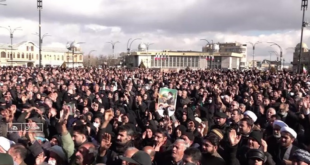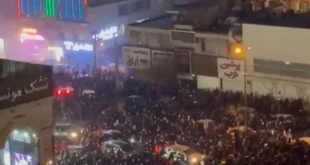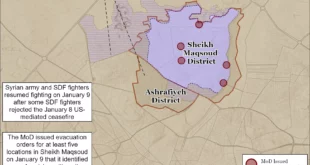 Also on Friday, two Israeli Apache attack helicopters crashed in northern Israel after colliding in midair, the Israel Defense Forces said. The pilot was killed and three others on board the copters were injured.
Also on Friday, two Israeli Apache attack helicopters crashed in northern Israel after colliding in midair, the Israel Defense Forces said. The pilot was killed and three others on board the copters were injured.
The U.S.-made Apaches, which carry a crew of two, collided near the border town of Avivim, the IDF reported.
Two more Israeli soldiers were confirmed dead Friday after battling Hezbollah guerrillas Thursday .In southern Lebanon — increasing the previous toll to four soldiers killed, the IDF told CNN.
A tank and an armored bulldozer were destroyed by rocket-propelled grenades, the IDF said.
The Israeli military said it attacked 40 targets in Lebanon overnight, going after missile-launching sites along the Israeli-Lebanese border. It also targeted Hezbollah headquarters, rocket launchers, vehicles, access routes and missile launching sites, the IDF said in a statement Friday.
The Israeli military says its air assault has destroyed about half of Hezbollah’s military strength. It is using ground forces to target Hezbollah artillery, believed hidden in caves, tunnels and basements in southern Lebanon.
CNN cannot independently confirm Israel’s estimation of Hezbollah’s military strength.
Speaking in an interview Thursday on Al-Jazeera television, Hassan Nasrallah, leader of the militant group, said Israel’s claims of eliminating half of Hezbollah’s fighting capacity were untrue.
Hezbollah “stood fast and has absorbed the strike” against it, he said. “They are unable up to this moment to do anything to harm us.”
The fighting began after Hezbollah captured two Israeli soldiers during a raid into northern Israel on July 12.
The Lebanese security forces said Thursday that 258 civilians have been killed and another 582 injured. But in a speech to diplomats in Beirut the day before, Lebanese Prime Minister Fouad Siniora put the death toll higher — at more than 300 — and said the wounded numbered about 1,000.
The newly reported deaths in southern Lebanon bring the number of confirmed Israeli military fatalities to 19, with another 15 civilians reported killed.
Violence on both sides of border
Although Israel believes “Hezbollah has been hurt considerably,” the military operation “is not over yet,” Israel’s security minister said Thursday.
“We are aiming and focused at dismantling the capability of this organization, prohibiting it from attacking Israel again and changing the rules of the game in the region,” Isaac Herzog said.
The operation will continue until that mission is complete, he said.
In anticipation of further strikes, the IDF has dropped leaflets written in Arabic to warn Lebanese civilians not to go near militants, at their own risk.
“Do not sleep or stand with Hezbollah in the same place,” the leaflets warned. “We are calling on the Lebanese people and army to avoid giving aid — direct or indirect — to Hezbollah elements. Anyone who does so will expose themselves and their lives to danger.”
Israeli airstrikes hit three Hezbollah training camps and Hezbollah-run Al Manar television in eastern Lebanon, the IDF said Thursday.
Hours earlier, dozens of warplanes dropped 23 tons of bombs on what Israel called a Hezbollah bunker, IDF sources said.
But the militant group said the bombs hit a mosque under construction and caused no casualties. Nasrallah’s television interview came nearly a day after the strike.
Meanwhile, guerrillas fired Katyusha rockets on cities in northern Israel, including Tiberias and Carmiel, according to the IDF. There were no reports of injuries.
Cease-fire chances
The Lebanese government, saying its citizens are taking the brunt of the damage, is pleading for a halt in violence.
Saying his country has been “torn to shreds,” Siniora estimated that the Israeli onslaught has displaced as many as a half-million Lebanese. He called for an immediate cease-fire.
In an address to the U.N. Security Council on Thursday, Secretary-General Kofi Annan demanded “an immediate cessation of hostilities” to prevent further loss of life, allow for humanitarian relief and give diplomacy a chance.
Israel has rejected calls for a cease-fire until it can push Hezbollah back from its northern frontier and retrieve its captured soldiers.
The United States and Israel consider Hezbollah a terrorist organization. The group, which has claimed responsibility for terrorist acts, also operates an extensive network of social services in Lebanon, and its political wing holds seats in the Lebanese parliament.
Israeli forces spent more than two decades occupying parts of southern Lebanon after a 1978 invasion to set up a buffer against guerrilla attacks. The United Nations verified Israel’s pullout in 2000.
Clashes in Gaza
A Palestinian militant and four others died in an attack on a Gaza City home Friday, Palestinian sources said.
The sources were not sure if the casualties were the result of an Israeli airstrike or artillery shelling.
Earlier Friday, Israeli tanks and troops withdrew from the Maghazi refugee camp in central Gaza after a deadly two-day raid, the Israel Defense Forces announced.
Since Israel began its latest push into central Gaza on Tuesday, 19 Palestinians have been killed, according to Palestinian sources.
Israel began military activity in Gaza on June 28, three days after Palestinian militants, including members of Hamas’ military wing, entered Israel, killed two soldiers and captured Cpl. Gilad Shalit, 19.
The militant groups holding Shalit have sought to swap him for Palestinian prisoners in Israeli jails. Israel has refused, saying a prisoner exchange would encourage more kidnappings.
Hamas is a Palestinian Islamic fundamentalist organization whose military wing, Izzedine al Qassam, has admitted responsibility for terrorist attacks against Israeli civilians as well as attacks against the Israeli military.
In other developments:
Â
Â
Â
Â
 Eurasia Press & News
Eurasia Press & News



